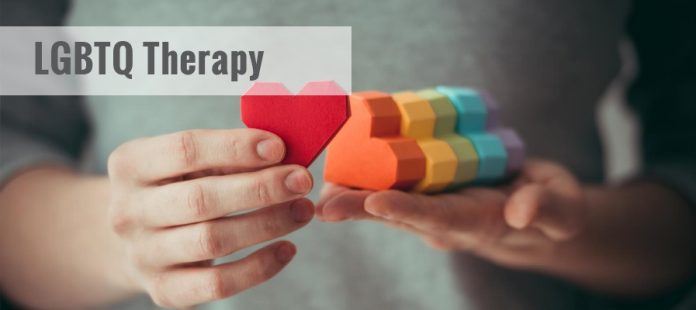Mental health support should feel safe, inclusive, and empowering—but unfortunately, that’s not always the case for LGBTQ+ individuals in traditional counseling settings. As awareness grows around identity-based trauma, the need for culturally competent, affirming care has become more urgent than ever. This is where the role of an LGBTQ+ therapist becomes essential.
While traditional counselors may offer general support, a LGBTQ+ therapist provides a level of cultural understanding and emotional safety that’s specifically tailored for those who identify within the LGBTQ+ spectrum. Let’s explore how these two approaches to therapy differ and why it matters for long-term mental wellness.
Understanding the Approach: Affirming vs. Neutral
Traditional therapy often approaches treatment from a generalized, “one-size-fits-all” perspective. While some traditional counselors may have training in diversity, they may not always be equipped to deal with the complex layers of identity, stigma, and trauma experienced by LGBTQ+ individuals.
On the other hand, LGBTQ+ therapists are specifically trained to approach sessions from an affirming, identity-centered perspective. This means your gender, sexuality, and relationship structures are not just acknowledged—they’re respected and incorporated into the therapeutic process without judgment.
Why Cultural Competence Makes a Difference
Cultural competence isn’t just about being open-minded; it’s about deeply understanding the lived experiences of clients. LGBTQ+ clients often face unique challenges that traditional therapists may overlook or misunderstand, such as:
- Microaggressions in everyday life
- Fear of rejection when coming out
- Intersectional discrimination (race, religion, gender identity)
- Navigating queer relationships and gender transition
- Family estrangement due to identity
An LGBTQ+ therapist is more likely to recognize these challenges and provide relevant tools to process them, avoiding retraumatization that can occur when therapists unintentionally invalidate their client’s identity.
Trust and Safety in the Therapeutic Relationship
Trust is foundational in any therapeutic relationship, but for LGBTQ+ individuals, the fear of being judged, misgendered, or stereotyped can be a barrier to opening up. Traditional counseling settings may unintentionally contribute to this anxiety if the therapist lacks sensitivity or experience in working with queer clients.
LGBTQ+ therapists offer an environment where clients don’t need to explain or defend their identity. This level of trust accelerates the healing process and allows therapy to focus on personal growth, mental health challenges, and emotional resilience—rather than constantly navigating identity-based misunderstandings.
Tailored Techniques for Queer and Trans Clients
While the structure of therapy sessions (like talk therapy, CBT, EMDR, or mindfulness techniques) may appear similar across all counselors, LGBTQ+ therapists adapt these tools with nuance. For instance:
- CBT techniques may be used to challenge internalized homophobia or transphobia.
- Trauma-informed approaches help process experiences of discrimination or harassment.
- Support for gender transition might include writing letters for hormone therapy or surgery access.
- Couples therapy may include same-sex or polyamorous relationship models.
This personalized approach is something traditional counseling may not offer unless the therapist has advanced training in queer-specific issues.
Addressing Mental Health Disparities in the LGBTQ+ Community
Statistics consistently show that LGBTQ+ individuals are at higher risk of mental health struggles compared to the general population. These include:
- Higher rates of anxiety and depression
- Increased suicidal ideation, particularly among LGBTQ+ youth
- Substance abuse issues
- Complex PTSD from systemic or familial rejection
An LGBTQ+ therapist doesn’t pathologize these struggles but recognizes them as logical responses to a hostile or invalidating environment. They support clients in reclaiming self-worth, building community, and fostering self-compassion.
Accessibility and Representation
With telehealth growing in popularity, LGBTQ+ therapists are becoming more accessible across regions—even for clients in conservative or rural areas. Clients can now seek therapists who reflect their values, identities, and lived experiences, regardless of location.
Representation in therapy matters. When a client sees themselves reflected in their therapist, whether through shared identity or understanding, it strengthens connection and outcomes.
FAQs: LGBTQ+ Therapist vs. Traditional Counseling
Q: What if my current therapist is not LGBTQ+ but I like them? Should I switch?
If you feel supported and safe, and your therapist is open to continued learning and listening, there’s no need to switch. However, if you feel unseen or invalidated, it may be helpful to explore working with a therapist who specializes in LGBTQ+ mental health.
Q: Can a traditional therapist be LGBTQ+ affirming?
Yes. Many traditional therapists are excellent allies who have undergone training in LGBTQ+ issues. But affirming credentials, ongoing education, and lived experience can make a big difference in therapeutic effectiveness.
Q: Is LGBTQ+ therapy only for queer or trans people?
No. While LGBTQ+ therapists specialize in supporting the queer community, they work with all clients who value inclusive and affirming care.
Q: What topics can I talk about with an LGBTQ+ therapist?
You can talk about anything—identity, relationships, anxiety, trauma, career, or family issues. LGBTQ+ therapists provide comprehensive care, not limited to identity-based issues.
Q: How do I find a queer-affirming therapist if I live in a rural area?
Online therapy has made affirming care widely accessible. You can search directories that allow you to filter by specialization in LGBTQ+ mental health and choose virtual sessions from anywhere.
Final Thoughts
Choosing between an LGBTQ+ therapist and a traditional counselor isn’t just about preferences—it’s about receiving care that truly understands and honors your whole identity. While traditional therapy can be helpful, working with a queer-affirming therapist often leads to deeper trust, more relevant coping strategies, and stronger long-term mental health outcomes.
Your healing journey deserves to begin in a space where your identity is not questioned, but embraced. Whether you’re dealing with everyday stress, major life transitions, or deep-seated trauma, working with the right therapist makes all the difference.

